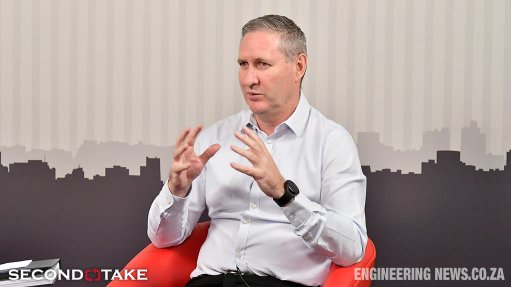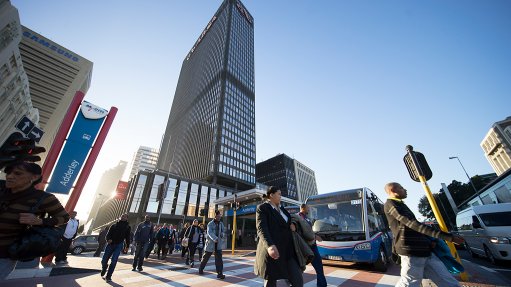South Africa’s 4IR starts with proper spectrum allocation, incentives
University of Johannesburg vice-chancellor and deputy chairperson of the Presidential Commission on the Fourth Industrial Revolution (PC4IR) Professor Tshilidzi Marwala has shared some the recommendations of the commission’s report around South Africa’s progress towards embracing the Fourth Industrial Revolution (4IR).
The report was presented to President Cyril Ramaphosa earlier in August, with the report due to be debated by Cabinet next, before being disseminated to the public.
Marwala said during a webinar hosted by the Southern African-German Chamber of Commerce and Industry on August 18 that the report would form the basis for the national discussion for a technologically enabled future that enhances the South African economy’s competitiveness, inclusively.
Marwala said global spending on artificial intelligence (AI) was expected to reach $27-billion a year by 2030, with AI spending growing at a compounded annual growth rate of 28%.
He said that amid the Covid-19 recovery and considering machines’ capability of assisting humans in solving issues such as poverty, the time is ripe for South Africa to leverage 4IR technologies for its recovery and social upliftment tasks.
PC4IR says that before any other recommendations can be implemented, government must consider the efficient and effective allocation of spectrum.
For example, spectrum must not be limited for allocation to telecommunications companies, but should also be available to every company needing spectrum in the manufacturing space.
Marwala explained that spectrum would have to be taken wherever it is demanded, even if it is taken away from institutions where it lies dormant.
RECOMMENDATIONS
Firstly, the commission says it will be necessary to invest in human capital and leverage points towards investing in human capital will have to be identified.
Marwala noted that, through the adoption of a “skills revolution”, there should be a focus on numerical and logic skills that feed into computational thinking and problem solving – which are essential in 4IR.
He believes government must establish an AI institute to focus on the research and development, implementation capabilities and application of AI in health, finance, mining, agriculture and manufacturing. This institute should be responsible for supporting capacity building and develop algorithms to create assets that can help relieve some issues in the economy.
The PC4IR suggests that a platform be established for advanced manufacturing and new materials. In the context of 4IR, the revolution needs to be supported by a State-led research initiative to grow advanced manufacturing and new materials.
Marwala said South Africa had been de-industrialising because there was minimal investment in new technologies for production.
“In turn, this makes it difficult for South Africa to outcompete companies from Vietnam, China and Germany, in terms of advanced manufacturing. This platform should be targeted to ensuring that we invest into technologies of production. This will, of course, be done by the private sector, but government has a role to play in the form of incentive schemes.”
The commission further recommends that government must secure and avail data to enable innovation. This is critical for building e-government services in health, transport and justice, particularly.
Marwala said making data available could be done in several ways, including through a national data centre.
"For example, public hospitals have data stored all over the place, but, should it be stored in a single warehouse, we can anonymise it to protect identifies and open the data up for people who have innovative ideas, which can lead to the commercialisation of applications in assisting the public healthcare sector’s performance.
“For us to succeed in the 4IR age, we need ways of storing vast amounts of data that is collected. If data is the new 'oil', it makes sense to store it, and it can be stored in the cloud. I don’t think it will be wise for government to try and build data centres, owing to a lack of resources at the moment, but government and the private sector should come together to figure out how data can be warehoused.
“Enter cloud computing, which does not require built computational capacity and can be done by partnering with the private sector.”
The commission believes government must incentivise “future” industries, platforms and applications of 4IR technologies.
Marwala believes that, with sufficient incentives in the economy, everything else will follow. This can be done through tax breaks and special economic zones.
The PC4IR points out that the single biggest limitation to 4IR is infrastructure.
Marwala said government would have to build technological infrastructure that integrates with existing infrastructure.
“We need to look at generation and the delivery of energy, it needs to be more reliable. We need to look at educational infrastructure as well to create a coherent and comprehensive training process that is linked to the activities of industry so that we can have a seamless transition from the schooling system to industry.
“We cannot do everything at the same time, we need to prioritise. We have not issued spectrum for 15 years. It needs to be done sooner rather than later.”
Further, Marwala says policy and legislation will have to be reviewed, amended and created where necessary to ensure that our laws are in line with 4IR.
“For example, our whole telecoms industry is regulated by the Independent Communications Authority of South Africa (Icasa). Now we are in the digital age where you have platform companies that operate from the cloud, where a regulated broadcaster such as South African Broadcasting Corporation is not the only means of communicating information anymore.
“Maybe we should also amend legislation to refocus the role of Icasa in line with current developments, away from the traditional telecoms era.”
Marwala further mentioned that it would bode well for a 4IR Strategy Implementation Coordination Council to be established in the Presidency. He suggested that this body should be populated by experts in the field, even if they come from private sector.
After the report has been approved by Cabinet, the PC4IR will work to mobilise all stakeholders in South Africa to start talking about and realising practical strategies for 4IR.
Comments
Announcements
What's On
Subscribe to improve your user experience...
Option 1 (equivalent of R125 a month):
Receive a weekly copy of Creamer Media's Engineering News & Mining Weekly magazine
(print copy for those in South Africa and e-magazine for those outside of South Africa)
Receive daily email newsletters
Access to full search results
Access archive of magazine back copies
Access to Projects in Progress
Access to ONE Research Report of your choice in PDF format
Option 2 (equivalent of R375 a month):
All benefits from Option 1
PLUS
Access to Creamer Media's Research Channel Africa for ALL Research Reports, in PDF format, on various industrial and mining sectors
including Electricity; Water; Energy Transition; Hydrogen; Roads, Rail and Ports; Coal; Gold; Platinum; Battery Metals; etc.
Already a subscriber?
Forgotten your password?
Receive weekly copy of Creamer Media's Engineering News & Mining Weekly magazine (print copy for those in South Africa and e-magazine for those outside of South Africa)
➕
Recieve daily email newsletters
➕
Access to full search results
➕
Access archive of magazine back copies
➕
Access to Projects in Progress
➕
Access to ONE Research Report of your choice in PDF format
RESEARCH CHANNEL AFRICA
R4500 (equivalent of R375 a month)
SUBSCRIBEAll benefits from Option 1
➕
Access to Creamer Media's Research Channel Africa for ALL Research Reports on various industrial and mining sectors, in PDF format, including on:
Electricity
➕
Water
➕
Energy Transition
➕
Hydrogen
➕
Roads, Rail and Ports
➕
Coal
➕
Gold
➕
Platinum
➕
Battery Metals
➕
etc.
Receive all benefits from Option 1 or Option 2 delivered to numerous people at your company
➕
Multiple User names and Passwords for simultaneous log-ins
➕
Intranet integration access to all in your organisation


















